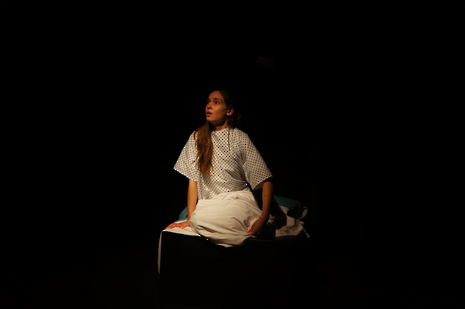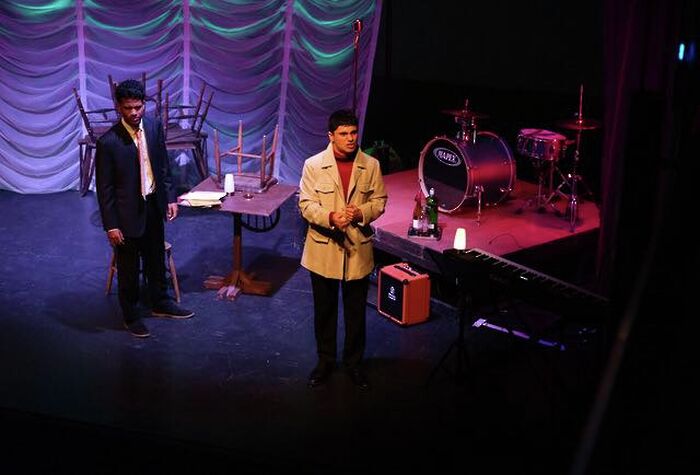Machinal review
This rhythmic piece has much to be commended, but overall leaves a feeling of incompleteness

The young woman (Inge-Vera Lipsius) and her husband (Ross McIntyre) sit side by side, each reading a newspaper, each picking up on different stories. The husband gets up to answer the phone, relays the conversation to his wife. She is disinterested. But she’s more than that. She is brimming, poised, stifled. There is a circularity to the couple’s conversation that is comical but also threatening, and each time her husband asks what she is reading, the young woman’s answer is darker. Lipsius manages this feeling of domestic restriction, the resentment-turned-hatred that characterises her relationship to her husband, with impressive confidence and maturity, and she (as is McIntyre) is at her best in this scene.
Lipsius’s performance is not perfect, however. She starts at fever-pitch and ends at fever-pitch: not much seems to change in her character as the play progresses. Perhaps this is a challenge presented by the play itself, as the intensity of the writing demands emotional strain from the beginning, but I felt that there were a number of moments where the climactic power was lost as a result of this lack of change. At the end of the newspaper scene which I described above, Lipsius’s character stands up and shouts into the darkness, deciding in this pivotal moment that she will do anything to be free – even murder her husband. This had scope to be such a terrifying moment, but by the time it was reached, it no longer felt like a climax.
What was most successful about the rest of this scene, however (and indeed, in my opinion, the rest of the play), was the use of rhythm. The speech of ‘Machinal’ is constructed out of rhythmic phrases which seem to form parts of a song, perhaps in an evocation of the eventual machine, or to emphasise this play as performance, and not merely story. All of the actors managed these rhythms skilfully, making them sound natural and not letting them interrupt the flow of speech, while still recognising and doing justice to the beauty of the speech movements.
Indeed it is not just Lipsius whose performance is to be commended: Louisa Stuart-Smith was hilarious as the mother, her shrill garrulousness verging on the chilling in its imposing sense of expectation; Charlie Saddington was wonderful in his casual softness in the speak-easy, and then in his wandering storytelling when he and Lipsius are in the bedroom together. The unspoken (and sometimes spoken) intimacy between the two actors in this scene was moving and uplifting, as the hopeful uncertainty of ‘quién sabe’ was repeated again and again and again.
"I think for a play to have a lasting impact it should make us think about our own situation here and now."
The whole play centres around this idea of the possibility freedom, around the excitement of a coin flip to decide who will pay a bill, and around the imagining of dark mountains to be climbed in a future not yet unfolded. We see a glimpse of freedom in this bedroom scene – the first time we see Lipsius’s character smile – but the only real liberty comes moments before the play’s tragic ending. Just when there is nothing to hope for, for a split second, this young woman is unchained from the expectations of society, her mother and her own self.

Othello Review
When I left the theatre, however, I was struck with a sense of incompleteness, and of something being not quite there. Perhaps I was wondering just what exactly the play made me think. This is a play set somewhere we, the Cambridge student audience, are not, in a time almost a century in the past, in a society where gender relationships, sexism and the pressures on women are, objectively although not completely, more extreme than anything we experience ourselves. These facts alone don’t deny the play relevance to a Cambridge audience, but I think for a play to have a lasting impact it should make us think about our own situation here and now. This is what the cast and crew of ‘Machinal’ did not quite get a hold on. The expressionism of the deconstructed scenes, broken down into locations and then into more suggestive abstract words, and then further into sounds and bursts of speech was artistically and aesthetically exciting and gripping, but more work could have been done to engage with the audience’s reality even within this disjoint.
All in all, the cast and crew of ‘Machinal’ should be proud of what they have created. This is a difficult form of theatre to pull off, and they have done so rhythmically and energetically, capturing the insane word-associations of this stifled young woman as she is pushed from the working scene to a domestic one to the maternity ward and then, eventually, to the law court. This is a daring artistic creation performed with skill and intensity, and maybe the fact that it isn’t perfect should be taken as part of the glory of modernist theatre.
 News / Christ’s announces toned-down ‘soirée’ in place of May Ball3 February 2026
News / Christ’s announces toned-down ‘soirée’ in place of May Ball3 February 2026 News / Right-wing billionaire Peter Thiel gives ‘antichrist’ lecture in Cambridge6 February 2026
News / Right-wing billionaire Peter Thiel gives ‘antichrist’ lecture in Cambridge6 February 2026 News / John’s duped into £10m overspend6 February 2026
News / John’s duped into £10m overspend6 February 2026 News / Epstein contacted Cambridge academics about research funding6 February 2026
News / Epstein contacted Cambridge academics about research funding6 February 2026 News / Lucy Cav students go on rent strike over hot water issues6 February 2026
News / Lucy Cav students go on rent strike over hot water issues6 February 2026









